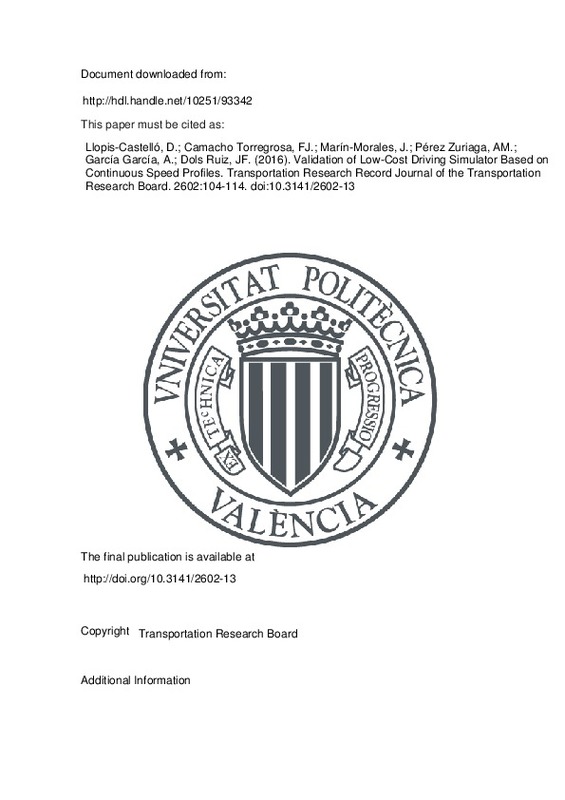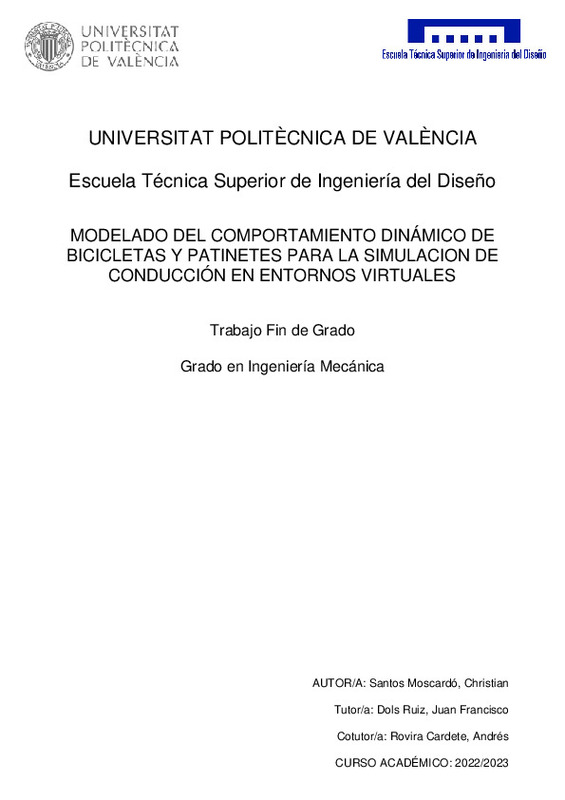JavaScript is disabled for your browser. Some features of this site may not work without it.
Buscar en RiuNet
Listar
Mi cuenta
Estadísticas
Ayuda RiuNet
Admin. UPV
Análisis de la carga cognitiva en la percepción de estímulos hápticos y visuales a través de una simulación en realidad virtual orientada al eco-driving
Mostrar el registro sencillo del ítem
Ficheros en el ítem
| dc.contributor.advisor | Contero González, Manuel Roberto
|
es_ES |
| dc.contributor.advisor | Ferrise, Francesco
|
es_ES |
| dc.contributor.author | Vázquez Rull, Marina
|
es_ES |
| dc.date.accessioned | 2020-04-06T15:14:16Z | |
| dc.date.available | 2020-04-06T15:14:16Z | |
| dc.date.created | 2019-09-11 | |
| dc.date.issued | 2020-04-06 | es_ES |
| dc.identifier.uri | http://hdl.handle.net/10251/140338 | |
| dc.description.abstract | [ES] El objetivo del proyecto propuesto es el desarrollo de un escenario de realidad virtual como una herramienta para la experimentación con dispositivos hápticos y su efecto en usuarios reales durante la conducción. En concreto, el proyecto consiste en el desarrollo de un producto háptico o de tipo visual integrado en el automóvil para asegurar un comportamiento sostenible durante la conducción. Con este dispositivo se pretende analizar el comportamiento de conducción del usuario y dar información de vuelta para hacerle entender qué comportamientos mejorarían su conducción para hacerla más sostenible. El desarrollo del proyecto consistirá en la creación de un escenario de conducción en realidad virtual mediante el software Unity 3D, en el que el usuario se sienta inmerso en una experiencia común de conducción, mientras recibe estímulos de actuadores que vendrán integrados en el equipo de testeo (volante, pedales, etc). El propósito final del proyecto será obtener resultados de la respuesta de los conductores mientras conducen en escenarios diferentes y reciben estímulos de tipo variado. Para la fase de resultados del proyecto, el sistema será testado por un grupo de investigación en el Departamento de Psicología de la Universidad de Milano-Bicocca. El aporte personal del alumno en este proyecto será enfocarse en los casos específicos en los que el usuario esta expuesto a situaciones típicas de estrés o distracción durante la conducción, recreándolos en el escenario virtual de la forma más realista posible, así como estudiar en detalle cómo responde el conductor a los estímulos mencionados en estos casos particulares. | es_ES |
| dc.description.abstract | [EN] This thesis work is part of a research activity carried out by the Mechanical Department of Politecnico di Milano together with the Psycology department of University of Milano Bicocca. The main scope of the project is the analysis and testing of set of techniques for in-vehicle assistance to encourage eco-driving. In the last decades, the environmental issue has become a topic of general interests, as the effects of human consumption habits has lead to a dramatic climate situation. One of the factor influencing the climate change the world is suffering, is the excessive quantity of greenhouse gases emission, caused by different sources exploitation, between which CO2 represents its vast majority. Transportation sector place an important role, being the second biggest source of CO2 emissions just after energy production. In this current context, immediate actions are necessary to be taken in order to get to the objectives raised by international institutions, from both governmental and population outlooks. Actuating on people¿s concern about environmental matters is crucial to get to change their behaviour to guide it into more sustainable approach. This study aims to make an influence on the specific sector of private transportation, as they as part of everyone¿s daily life in most developed countries. Recently, a wide range of attempts to improve and optimize car engines emissions are done, or even moving the private vehicles market to a electrical context. However, by only changing the source of energy used in cars is not the final solution. The energy production sector represents the greatest emissions source and, even though its creation could be achieved with clean sources, it currently represents a small percentage of all the worldwide produced energy. Taking all this into consideration, it is obvious that a general energy consumption saving needs to be accomplished. Drivers are normally not aware on how much they could help to improve energy consumption and thus CO2 emission by just changing some driving customs. There are a set of studied behaviours that would be desired to be avoided when driving for a less emissive and consuming driving performance, like aggressive riding styles, keeping high speed values or accelerating and decelerating abruptly. For this reason, providing users with feedback information that makes them understand the negative effects of their driving performance would help mitigate the fact that no immediate conciousness of effects of the actions are perceived by people when using a product in a unsustainable way. The particular objective of this document is to serve as an initial base of system validation by developing a Virtual Reality scenario as a tool for testing diverse eco-driving in-vehicle devices. Assistance systems of different nature have been purposed, with haptic and visual devices designed as a first approach to the final product. An implementation of both types of systems would be included in a developed set-up in order to carry out a number of experiments that could give an outcome of the effectiveness of feedback information comprehension and get a comparative view of their performances. The feedback stimuli is provided based on the driving behaviour observed during the tests, being actuated when accelerations values overcome optimal thresholds (defined in literature) or driving speed is too high. The real-time energy consumption of the route done during the experiments is registered, serving as a method of comparison of the efficiency of every eco-driving message. The work done in this document as been based on a previous study carried out by a student, in which an intense study of the stimuli deliver and its efficacy was done. However, driving is an activity that requires from a great cognitive workload, in which a bad understanding of the messages coming from the vehicle could lead on danger situations. For this reason, not only a psychological study of the eco-feedback mess | es_ES |
| dc.language | Inglés | es_ES |
| dc.publisher | Universitat Politècnica de València | es_ES |
| dc.rights | Reserva de todos los derechos | es_ES |
| dc.subject | Eco-driving | es_ES |
| dc.subject | Realidad Virtual | es_ES |
| dc.subject | Unity 3D | es_ES |
| dc.subject | Estrés en la conducción | es_ES |
| dc.subject | Háptica | es_ES |
| dc.subject | Escenario Virtual | es_ES |
| dc.subject | Situaciones de Distracción en la Conducción | es_ES |
| dc.subject | Sostenibilidad | es_ES |
| dc.subject | Simulador de Conducción | es_ES |
| dc.subject | Virtual Reality | es_ES |
| dc.subject | Unity3D | es_ES |
| dc.subject | Driving Stress | es_ES |
| dc.subject | Haptics | es_ES |
| dc.subject | Virtual Scenario | es_ES |
| dc.subject | Driving Distraction Situations | es_ES |
| dc.subject | Sustainability | es_ES |
| dc.subject | Driving Simulator | es_ES |
| dc.subject.classification | EXPRESION GRAFICA EN LA INGENIERIA | es_ES |
| dc.subject.other | Máster Universitario en Ingeniería Industrial-Màster Universitari en Enginyeria Industrial | es_ES |
| dc.title | Análisis de la carga cognitiva en la percepción de estímulos hápticos y visuales a través de una simulación en realidad virtual orientada al eco-driving | es_ES |
| dc.type | Tesis de máster | es_ES |
| dc.rights.accessRights | Cerrado | es_ES |
| dc.contributor.affiliation | Universitat Politècnica de València. Departamento de Ingeniería Gráfica - Departament d'Enginyeria Gràfica | es_ES |
| dc.contributor.affiliation | Universitat Politècnica de València. Escuela Técnica Superior de Ingenieros Industriales - Escola Tècnica Superior d'Enginyers Industrials | es_ES |
| dc.description.bibliographicCitation | Vázquez Rull, M. (2019). Análisis de la carga cognitiva en la percepción de estímulos hápticos y visuales a través de una simulación en realidad virtual orientada al eco-driving. http://hdl.handle.net/10251/140338 | es_ES |
| dc.description.accrualMethod | TFGM | es_ES |
| dc.relation.pasarela | TFGM\112759 | es_ES |
Este ítem aparece en la(s) siguiente(s) colección(ones)
-
ETSII - Trabajos académicos [10404]
Escuela Técnica Superior de Ingenieros Industriales




![[Cerrado]](/themes/UPV/images/candado.png)




